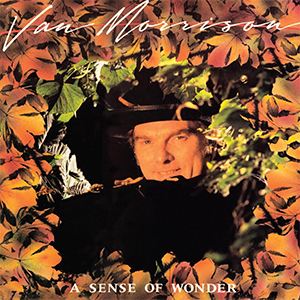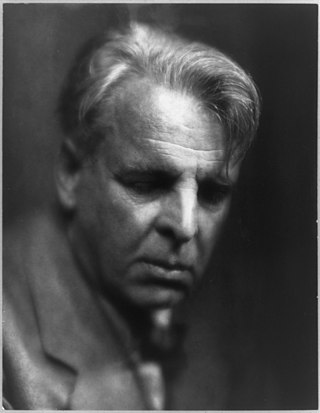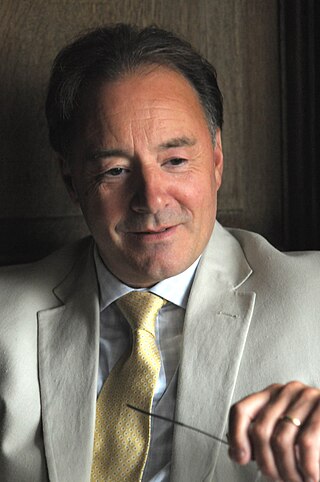
William Butler Yeats was an Irish poet, dramatist, writer and politician. One of the foremost figures of 20th-century literature, he was a driving force behind the Irish Literary Revival and became a pillar of the Irish literary establishment who helped to found the Abbey Theatre. In his later years, he served two terms as a Senator of the Irish Free State.

Ivor Bertie Gurney was an English poet and composer, particularly of songs. He was born and raised in Gloucester. He suffered from bipolar disorder through much of his life and spent his last 15 years in psychiatric hospitals. Critical evaluation of Gurney has been complicated by this, and also by the need to assess both his poetry and his music. Gurney himself thought of music as his true vocation: "The brighter visions brought music; the fainter verse".
"The Second Coming" is a poem that was written by Irish poet W. B. Yeats in 1919, first printed in The Dial in November 1920 and included in his 1921 collection of verses Michael Robartes and the Dancer. The poem uses Christian imagery regarding the Apocalypse and Second Coming to allegorically describe the atmosphere of post-war Europe. It is considered a major work of modernist poetry and has been reprinted in several collections, including The Norton Anthology of Modern Poetry.
Seumas or Seamus O'Sullivan was an Irish poet and editor of The Dublin Magazine. His father, William Starkey (1836-1918), a physician, was also a poet and a friend of George Sigerson. He was born in Dublin and spent his adult life in the suburb of Rathgar. In 1926, he married the artist Estella Solomons, sister of Bethel Solomons. Her parents were opposed to the marriage as Seumas was not Jewish.
The Cuala Press was an Irish private press set up in 1908 by Elizabeth Yeats with support from her brother William Butler Yeats that played an important role in the Celtic Revival of the early 20th century. Originally Dun Emer Press, from 1908 until the late 1940s it functioned as Cuala Press, publicising the works of such writers as Yeats, Lady Gregory, Colum, Synge, and Gogarty.
The Countess Kathleen and Various Legends and Lyrics (1892) is the second poetry collection of W. B. Yeats.

"The Stolen Child" is an 1889 poem by William Butler Yeats, published in The Wanderings of Oisin and Other Poems.

A Sense of Wonder is the fifteenth studio album by Northern Irish singer-songwriter Van Morrison released in 1985. On first release, original pressings had to be recalled when the W. B. Yeats estate refused to allow Morrison's musical version of the poem "Crazy Jane on God" to be included, as they believed his poems should only be set to classical music. Morrison substituted "If You Only Knew" for the Yeats' recording..
The Countess Cathleen is a verse drama by William Butler Yeats in blank verse. It was dedicated to Maud Gonne, the object of his affections for many years.

"Politics" is a poem by Irish poet William Butler Yeats written on May 24, 1938. It was composed during the time of the Spanish Civil War as well as during the pre-war period of Adolf Hitler's Third Reich in Germany. The poem hints at the political situations of "Rome" (Italy), "Russia", and Spain, but ultimately discusses topics more relevant to private human interaction rather than public, or political situations. The poem never mentions Germany or Hitler, despite the fact that the "war and war's alarms" surrounding the poem's creation arose from fears of Germany's aggression rather than Italy's, Russia's, or Spain's. Many versions of the text exist: the original typescript of May 1938, the first typescript with hand-written corrections dated August 12, 1938, as well as a final "Coole Edition" of the poem dated June 29, 1939, which was not published until it was included in Last Poems in 1939. Yeats intended for the poem to be printed last in the collection, as an envoi to "The Circus Animals' Desertion", and while a debate as to the true order of the poems has continued since 1939, "Politics" was the last lyric poem Yeats wrote and remains the final work printed in all posthumous editions.
"Down by the Salley Gardens" is a poem by William Butler Yeats published in The Wanderings of Oisin and Other Poems in 1889.

"On being asked for a War Poem" is a poem by William Butler Yeats written on February 6, 1915 in response to a request by Henry James that Yeats compose a political poem about World War I. Yeats changed the poem's title from "To a friend who has asked me to sign his manifesto to the neutral nations" to "A Reason for Keeping Silent" before sending it in a letter to James, which Yeats wrote at Coole Park on August 20, 1915. The poem was prefaced with a note stating: "It is the only thing I have written of the war or will write, so I hope it may not seem unfitting." The poem was first published in Edith Wharton's The Book of the Homeless in 1916 as "A Reason for Keeping Silent". When it was later reprinted in The Wild Swans at Coole, the title was changed to "On being asked for a War Poem".
This is a list of all works by Irish poet and dramatist W. B. Yeats (1865–1939), winner of the 1923 Nobel Prize in Literature and a major figure in 20th-century literature. Works sometimes appear twice if parts of new editions or significantly revised. Posthumous editions are also included if they are the first publication of a new or significantly revised work. Years are linked to corresponding "year in poetry" articles for works of poetry, and "year in literature" articles for other works.
"The Lake Isle of Innisfree" is a twelve-line poem comprising three quatrains, written by William Butler Yeats in 1888 and first published in the National Observer in 1890. It was reprinted in The Countess Kathleen and Various Legends and Lyrics in 1892 and as an illustrated Cuala Press Broadside in 1932.
"Aedh Wishes for the Cloths of Heaven" is a poem by William Butler Yeats. It was published in 1899 in his third volume of poetry, The Wind Among the Reeds.
Cradle song usually refers to a lullaby.

Ian Venables is a British composer of art songs and chamber music.
Muriel Emily Herbert was a British composer of the early 20th century. Much of her work is for solo voice and piano, with art song settings of texts by English and Irish poets such as Thomas Hardy, Robert Herrick, Ben Jonson, James Joyce, and W.B. Yeats.
"The Song of Wandering Aengus" is a poem by Irish poet W. B. Yeats. It was first printed in 1897 in British magazine The Sketch under the title "A Mad Song." It was then published under its standard name in Yeats' 1899 anthology The Wind Among the Reeds. It is especially remembered for its two final lines: "The silver apples of the moon,/ The golden apples of the sun."






